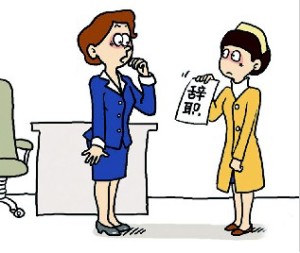 Culture Shock Is No Shock
Culture Shock Is No Shock
By Robert Parkinson-CEO of RMG Selection
This article is about the new expat-executive in China. I am writing to offer my perspective on what it’s like to be the new boy (or girl) in a country that some people regard as the embodiment of culture shock itself.
First I’m going to talk about two typical situations that I have encountered over 10 years in the country. Then I’m going to offer some analysis. These are just my opinions, but I hope you find them helpful.
All Change!
The first pattern of expat-behavior which I have experienced as a new GM in China, and heard repeated by many others, is the “All Change Please” mentality. The confident expat is “pumped up” at being sent to “one of our most important markets,” delighted to have a chauffeur (how many middle managers have drivers in the West?), and still flush with the afterglow of flying at the front, or at least the middle of the plane. She or he wants to do one thing and one thing only: MAKE THEIR MARK! (If you’re British) KICK SOME BUTT (If you’re an American) or DEAL WITH ISSUES! (If you’re from down-under).
Logically, relocating to a place like China is something of a high-profile position so there is a natural desire to impress others and get results. However do keep the following in mind:
The road to Sino-Success is littered with the souls of expats who go back early or whose contracts are not renewed because they “fixed what wasn’t broken.” If it isn’t broke don’t fix it.
In The Seven Habits of Highly Effective People Stephen Covey says you should listen first; then you’ll be listened to. This is just logical — but it’s amazing how many people do not do this, and nowhere is it more appropriate than China.
It is true that Western culture and Asian culture are different. Don’t make the mistake of thinking that you have to change what you do 180 degrees, but you certainly do have to respect the people (and their communication preferences, which I will address later).
The following is a good example for illustration. Imagine working in London, for a Chinese boss who speaks to you in Mandarin. If your boss insisted that the “British way” did not work in Britain, how would you react? I would think he needed mental health treatment. Isn’t it true that many foreigners make exactly this mistake in China?
Head-office
The second misperception which runs right through my network of GM level connections, particularly among small and medium-sized enterprises, is that one of your biggest challenges is the “head-office.” An experienced businessman I know well, who has had enormous and repeated successes, says, “I’ve been doing business in China for 10/12/15 years (etc),” and that simply is not the case. Getting on a plane three times a year and coming to China for a week is not “doing business here.” It’s a tiny, jetlagged glimpse through a tiny crack in a window. This is not the real-time real-life day-to-day understanding of a community/country that you get from living somewhere.
The problem, of course, is that head-office believes it is. They think they do “get it” and that they are qualified to make judgements about “your market,” and actually they are – a bit – because what they lack in ground-level understanding, they gain in perspective.
Here are some points to think about:
Congratulations. You are now officially a juggler. Your job is not to general-manage, it’s to manage (cope) with the expectations of the local staff (and of course you spend your first two years tripping over your own mistakes — I know I did) and the demands of head-office. You are now more therapist than general manager. Congratulations again.
Whoever said running a business was unambiguous? There will be things that never make sense. Get used to it. Ambiguity is part of the job. One major U.S. computer manufacturer actually tests for “ability to handle ambiguity” as an HR competency
Remember who you actually have to live and work with on a day-to-day basis.
Remember who pays for your driver and biz-class flights.
Ten Years on
Ten years after moving to this wonderful, crazy, frenetic, confusing, engaging place that’s called the People’s Republic of China, I consider that I have learned a few things that I’d like to share:
Yes, there are cultural differences, but there are far more similarities…however…
… Chinese culture is ancient, really ancient. Do you really think you can reverse how people intuitively think and do business? Remember my earlier Chinaman in London story.
I think the key point is listening and communication. Don’t obsess over getting “your own way,” obsess with being seen as someone who will listen (by the way, I still remind myself of this daily, and I am no expert).
Following on from the last point, DO NOT turn your internal company relationships into “us & them” situations where it’s your local staff vs. the head-office. This is fatal. We’re all people working for the same company, with the same goals. We will have the same basic needs.
The more interested you are in China, the more interested you’ll become.
Learn more Chinese. Just being able to order beer is not enough.
There you go. I hope this is useful to you. Good luck.
Read the original link at: http://www.chinatoday.com.cn/english/life/2014-08/05/content_633245.htm

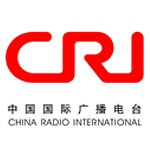

 求职者们跳槽的原因总是随着时间的推进有所变化。从早期人们跳槽只向“钱”看齐,到后来人们对公司文化和直线经理管理风格等软性因素的关注,这前后的变化让HR经理人们开始思考保留员工以及吸引新鲜血液的法宝到底是什么。根据罗迈国际2013年《中国人才流动调查报告》(TSF2),针对69%的调查参与者,跳槽时首当其冲的原因便是涨薪。因此,罗迈国际在2014年的一些列市场调研中针对涨薪进行了深入调查。
1、如果跳槽到另外一家公司,你期待薪水增长多少?
根据涨薪调研结果显示,2014年53%的调查参与者对于跳槽之后涨薪的期待范围在0%-20%。与2013年的情况相比,20%的跳槽薪水增长对于当时八成调查参与者来说仅是个起点而已。34%的求职者期待20%-30%的涨薪幅度,这个数据与去年相比基本持平。关于期待涨薪超过30%的求职者,从去年的43%垂直下降到了13%。不难看出今年求职者们在跳槽时对薪水的期待趋于谨慎。
然而根据中国之声《央广新闻》在2014年2月21日报道的企业涨薪数据来看,情况并不乐观。新闻中提到2014年58%的涨薪幅度在6%-10%,仅有9%的企业能达到10%以上的涨薪。同时,根据不同行业,涨薪幅度差异很大。比如,新型高科技,移动医疗,电子商务,以及传统垄断行业的加薪幅度都会相对较大。求职者们跳槽都希望谋得良好的薪资福利待遇,然而企业(尤其对于中小企业)则要考虑吸收人才和运营成本之间的平衡。
涨多少薪水合适——图一图二
求职者们跳槽的原因总是随着时间的推进有所变化。从早期人们跳槽只向“钱”看齐,到后来人们对公司文化和直线经理管理风格等软性因素的关注,这前后的变化让HR经理人们开始思考保留员工以及吸引新鲜血液的法宝到底是什么。根据罗迈国际2013年《中国人才流动调查报告》(TSF2),针对69%的调查参与者,跳槽时首当其冲的原因便是涨薪。因此,罗迈国际在2014年的一些列市场调研中针对涨薪进行了深入调查。
1、如果跳槽到另外一家公司,你期待薪水增长多少?
根据涨薪调研结果显示,2014年53%的调查参与者对于跳槽之后涨薪的期待范围在0%-20%。与2013年的情况相比,20%的跳槽薪水增长对于当时八成调查参与者来说仅是个起点而已。34%的求职者期待20%-30%的涨薪幅度,这个数据与去年相比基本持平。关于期待涨薪超过30%的求职者,从去年的43%垂直下降到了13%。不难看出今年求职者们在跳槽时对薪水的期待趋于谨慎。
然而根据中国之声《央广新闻》在2014年2月21日报道的企业涨薪数据来看,情况并不乐观。新闻中提到2014年58%的涨薪幅度在6%-10%,仅有9%的企业能达到10%以上的涨薪。同时,根据不同行业,涨薪幅度差异很大。比如,新型高科技,移动医疗,电子商务,以及传统垄断行业的加薪幅度都会相对较大。求职者们跳槽都希望谋得良好的薪资福利待遇,然而企业(尤其对于中小企业)则要考虑吸收人才和运营成本之间的平衡。
涨多少薪水合适——图一图二
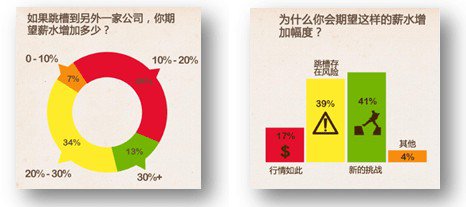 2、为什么你会期望这样的薪水增加幅度?
这是一个看似没有必要问的问题,仿佛跳槽涨薪是理所当然啊!但调查起来发现人才的想法确实各有不同,并且,在了解涨薪期待原因的基础上,雇主才能更好地决策薪酬涨幅。罗迈国际RMG的调查结果显示,41%的调查参与者认为新工作中的挑战是值得自己提出加薪期待值的重要原因。另外,39%的求职者提出跳槽是找寻机遇,同时也要承担相应的风险,毕竟是从一个自己十分熟悉的环境进入一个完全陌生的公司,为了降低个人承担的风险,新公司在涨薪上给予对方安全感可以更好地吸引新人才。仅有不到二成的求职者会根据所谓的“涨薪常识”,随意提出涨薪要求。罗迈求职顾问建议求职者切勿随意提涨薪,否则失去新工作机会的几率会大幅增加,也是对自己职业发展的不负责。在提出期待值之前,一定要首先明确个人能为新公司带来的价值。
3、很多雇主认为,涨薪不仅无法激励员工更努力地工作,一旦造成员工福利补贴不公平,还会对员工产生负面影响。对于这个观点,你同意吗?
这个问题事实上是非常多的管理层及人力资源部门工作者会关心的问题,尤其是很多直线经理,或多或少会有类似的担心。罗迈国际针对这种普遍情况在调查中提出了该问题,其结果显示担心并非无由之谈,有26%的求职者对该问题持肯定观点,35%则持反对观点,更多的人选择了不确定的选项。可见对于业绩考核优秀的员工,涨薪无疑是激励他们更加努力工作的最好措施。甚至,他们的升职加薪会为其他员工树立榜样,让其他没有加薪的人找到奋斗目标。
然而,很多企业中加薪的事实情况是同时间区间内业绩优异的员工有若干个,但是由于企业运营成本问题,获得加薪机会的员工可能仅占20%。剩余优秀员工中那80%的员工就属于35%的范畴了。同样的业绩表现,不同的待遇会让这些员工感到企业的不公平待遇。此时,他们的离职意愿会比以往更强。因此,我们建议企业在激励优秀员工的同时,切勿忽略其他员工的感受,而对这种感受的关切更应体现在平时,在适当的时机增加公开表扬或者一些物质奖励不失为有效的平衡与管理措施。
涨多少薪水合适——图三图四
4、你是否认为白领对跳槽加薪的要求太过分了?(期望过高)
之所以在本期调查中提出这个问题,是因为我们旨在了解求职者们是否清楚当今跳槽加薪要求的合理性。而对于调查结果,我们并不感到意外。虽然求职者们一直强调跳槽时最看重薪水增长幅度,然而56%的求职者对于自己的跳槽加薪要求都充满了不确定性,甚至17%的调查参与者同意“白领队跳槽加薪的要求太过分了”。这一调查结果也呼应了第一题中求职者们跳槽加薪趋于谨慎的调查结果,以及《央广新闻》中提到的2014年企业加薪情况。其次,各个行业非公开非透明的跳槽涨薪“规则”也是导致求职者们不确定加薪合理与否的原因之一。综合来看,涨多少合适,是一个由市场、雇主、应聘者三方相互作用的结果,任何一方提出过于不合理的需求都将打破平衡。可以肯定的是,合理的涨薪无论对于内部还是新招聘,都是有利于企业人才发展的,而一些“待价而沽”的应聘者们,也应随时调整心态,争取更有优势的职业发展才是要务。
2、为什么你会期望这样的薪水增加幅度?
这是一个看似没有必要问的问题,仿佛跳槽涨薪是理所当然啊!但调查起来发现人才的想法确实各有不同,并且,在了解涨薪期待原因的基础上,雇主才能更好地决策薪酬涨幅。罗迈国际RMG的调查结果显示,41%的调查参与者认为新工作中的挑战是值得自己提出加薪期待值的重要原因。另外,39%的求职者提出跳槽是找寻机遇,同时也要承担相应的风险,毕竟是从一个自己十分熟悉的环境进入一个完全陌生的公司,为了降低个人承担的风险,新公司在涨薪上给予对方安全感可以更好地吸引新人才。仅有不到二成的求职者会根据所谓的“涨薪常识”,随意提出涨薪要求。罗迈求职顾问建议求职者切勿随意提涨薪,否则失去新工作机会的几率会大幅增加,也是对自己职业发展的不负责。在提出期待值之前,一定要首先明确个人能为新公司带来的价值。
3、很多雇主认为,涨薪不仅无法激励员工更努力地工作,一旦造成员工福利补贴不公平,还会对员工产生负面影响。对于这个观点,你同意吗?
这个问题事实上是非常多的管理层及人力资源部门工作者会关心的问题,尤其是很多直线经理,或多或少会有类似的担心。罗迈国际针对这种普遍情况在调查中提出了该问题,其结果显示担心并非无由之谈,有26%的求职者对该问题持肯定观点,35%则持反对观点,更多的人选择了不确定的选项。可见对于业绩考核优秀的员工,涨薪无疑是激励他们更加努力工作的最好措施。甚至,他们的升职加薪会为其他员工树立榜样,让其他没有加薪的人找到奋斗目标。
然而,很多企业中加薪的事实情况是同时间区间内业绩优异的员工有若干个,但是由于企业运营成本问题,获得加薪机会的员工可能仅占20%。剩余优秀员工中那80%的员工就属于35%的范畴了。同样的业绩表现,不同的待遇会让这些员工感到企业的不公平待遇。此时,他们的离职意愿会比以往更强。因此,我们建议企业在激励优秀员工的同时,切勿忽略其他员工的感受,而对这种感受的关切更应体现在平时,在适当的时机增加公开表扬或者一些物质奖励不失为有效的平衡与管理措施。
涨多少薪水合适——图三图四
4、你是否认为白领对跳槽加薪的要求太过分了?(期望过高)
之所以在本期调查中提出这个问题,是因为我们旨在了解求职者们是否清楚当今跳槽加薪要求的合理性。而对于调查结果,我们并不感到意外。虽然求职者们一直强调跳槽时最看重薪水增长幅度,然而56%的求职者对于自己的跳槽加薪要求都充满了不确定性,甚至17%的调查参与者同意“白领队跳槽加薪的要求太过分了”。这一调查结果也呼应了第一题中求职者们跳槽加薪趋于谨慎的调查结果,以及《央广新闻》中提到的2014年企业加薪情况。其次,各个行业非公开非透明的跳槽涨薪“规则”也是导致求职者们不确定加薪合理与否的原因之一。综合来看,涨多少合适,是一个由市场、雇主、应聘者三方相互作用的结果,任何一方提出过于不合理的需求都将打破平衡。可以肯定的是,合理的涨薪无论对于内部还是新招聘,都是有利于企业人才发展的,而一些“待价而沽”的应聘者们,也应随时调整心态,争取更有优势的职业发展才是要务。

 Working with Third Party Recruiters
Working with Third Party Recruiters
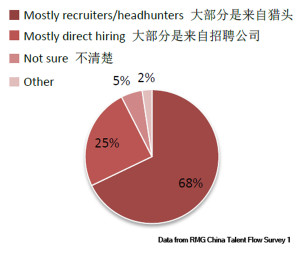
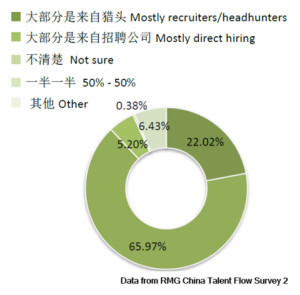

 Culture Shock Is No Shock
By Robert Parkinson-CEO of RMG Selection
Culture Shock Is No Shock
By Robert Parkinson-CEO of RMG Selection

